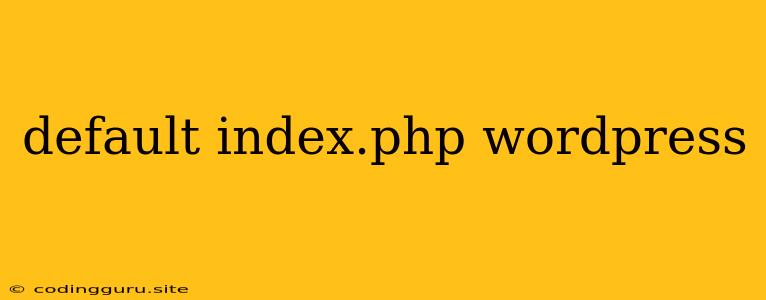Understanding the Default index.php in WordPress
WordPress, a popular content management system (CMS), relies heavily on a file named index.php. This file acts as the default index.php for your WordPress website, handling various crucial functions. But what exactly does this file do, and why is it so important?
What is the index.php file?
The index.php file is the cornerstone of your WordPress website. It's the starting point for every page on your website, whether it's your home page, a blog post, or any other custom page you create. It serves as a central hub, connecting various components and functionalities.
What does index.php do?
The index.php file primarily does the following:
- Includes Core WordPress Files: It incorporates essential WordPress files like
wp-load.php,wp-config.php, andwp-settings.php. These files contain vital code responsible for core functions, database connection, and loading necessary plugins and themes. - Defines Header: It includes the header section of your website, displaying important elements like the header navigation, logo, and other styling.
- Displays Content: Based on the requested page, it fetches and displays the appropriate content, whether it's a blog post, a static page, or a custom post type.
- Includes Footer: It concludes the page by adding the footer section, which usually includes copyright information, site navigation, and additional scripts.
Why is it important?
The index.php file is vital for several reasons:
- Structure: It defines the overall structure and layout of your WordPress website.
- Functionality: It governs the core functionality of your website, including loading content, displaying menus, and executing various actions based on user interaction.
- Theme Integration: It integrates with your theme's template files to customize the look and feel of your website.
Can you edit the index.php file?
While you can modify the index.php file, it's generally not recommended. Making changes directly to this file can break your website's functionality. Instead, you should focus on customizing your website using WordPress themes and plugins. These offer a safer and more organized way to make changes.
When might you need to edit index.php?
There are rare instances where you might need to directly edit the index.php file:
- Advanced Customization: For highly specific customizations that aren't achievable through themes or plugins, you might need to add custom code snippets to
index.php. - Plugin Conflicts: If a plugin is causing conflicts with your theme or other plugins, you might need to adjust the
index.phpfile to resolve the issues.
Tips for working with index.php
- Always back up your website: Before making any changes, create a backup of your entire website.
- Use a child theme: Modify your theme using a child theme, which allows you to override theme files without altering the original theme.
- Test your changes: After making any changes, test your website thoroughly to ensure everything functions as expected.
Conclusion
The index.php file is a key element of WordPress, serving as the default starting point for all pages on your website. It plays a crucial role in displaying content, managing website structure, and integrating with themes and plugins. While direct editing is generally discouraged, understanding the file's importance and its role in WordPress is crucial for effective website management.
